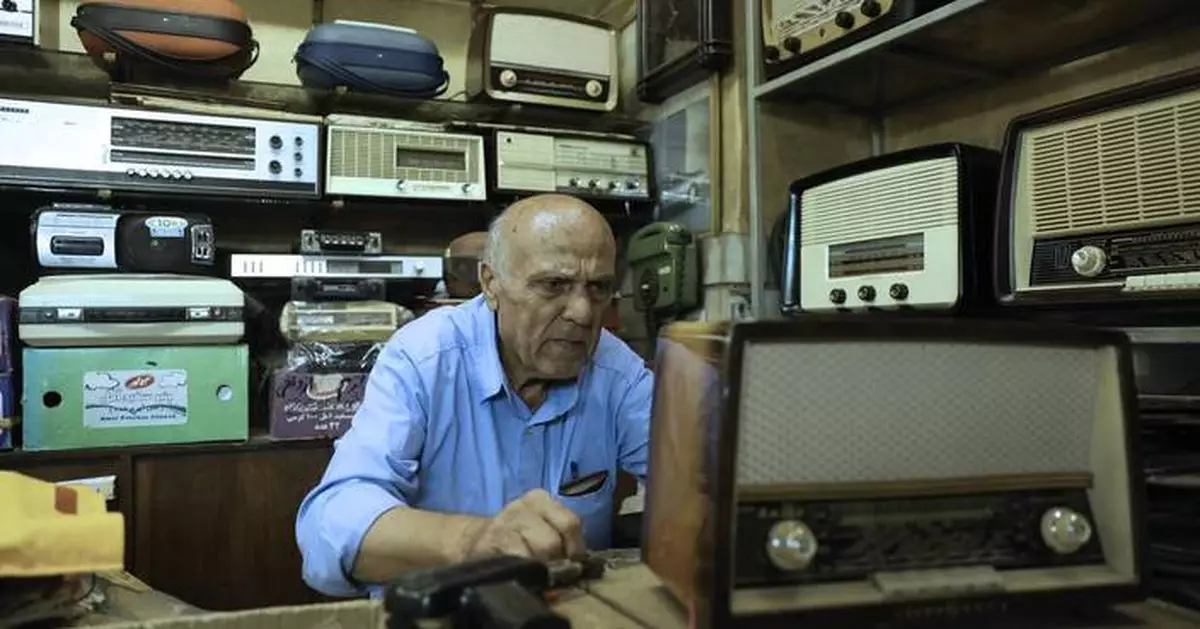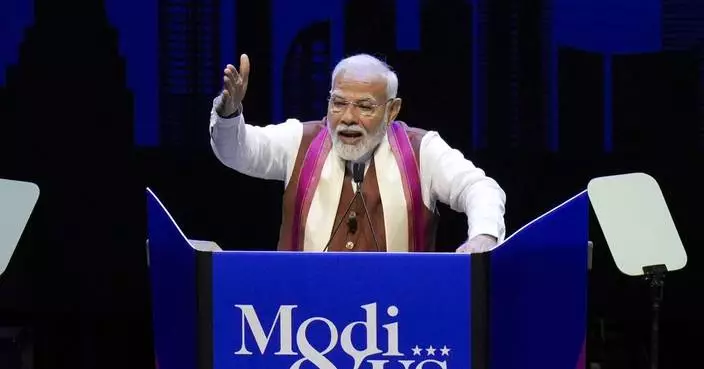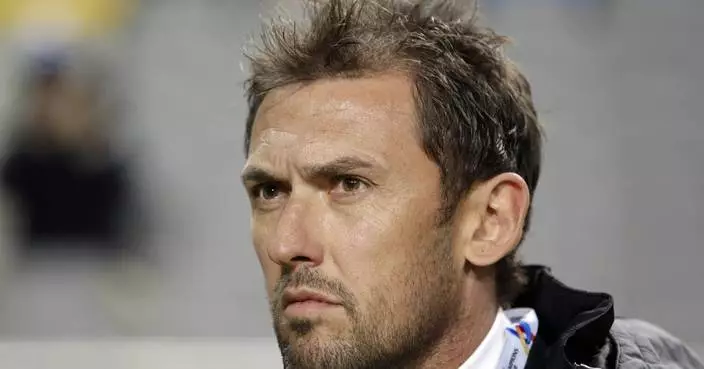TEHRAN, Iran (AP) — While tensions remain high between the U.S. and Iran, there's at least one American that state radio in Tehran invites on the air each week for its millions of listeners. It's just that he's a fictional insurance fraud detective who's been on the case since 1949.
“Yours Truly, Johnny Dollar,” a radio program created by CBS that later found a devoted listenership in Iran for a Farsi-language version under Shah Mohammad Reza Pahlavi in the 1960s, has returned to Iranian radio.
It's not clear why exactly the network controlled by hard-liners have decided to bring back “the man with the action-packed expense account,” but his reappearance harkens back to an era when Iran and the U.S. enjoyed incredibly close relations.
And the newly produced episodes introduce younger generations to a character that many older Iranians still have a decades-old fondness for, their ears perking up with show’s signature start with three gunshots and Johnny Dollar answering a ringing phone with its title.
“It is amazing, it reminds me of the ‘60s and ’70s, when I listened to the episodes with my parents through a vacuum tube radio," said Masoud Kouchaki, 73. "We did not have any worries except for guessing how Johnny Dollar would find the murderer.”
The original CBS radio show ran from 1949 until 1962 and focused on the cases of Johnny Dollar, an investigator from Hartford, Connecticut. The serial relied on the investigator's expenses account entries — like “$10 deposit on the car I rented" or "one dollar, one drink for me" — to propel the story forward as Dollar interviewed witnesses and suspects in the transatlantic accent common to detective stories of the era.
“CBS steadfastly resisted moving it to television when television was peeling off lots of radio programing, lots of radio content, lots of radio actors," said John F. Barber, a professor in the digital technology and culture program at Washington State University Vancouver and expert on “Johnny Dollar” and other radio dramas of the era.
“They took a gamble that radio drama would continue to attract audiences. ... It does come at the end of the golden age of radio, before television became the primary entertainment source in America.”
For Iranians, state radio first went on the air in 1940, part of the efforts by then-ruler Reza Shah to rapidly modernize the country. His son, Shah Mohammad Reza Pahlavi, took over in 1941, and for several decades radio remained the key media consumed in his growing country, with the number of stations few and all state-controlled.
Iran's version of “Yours Truly, Johnny Dollar" dropped the expense account format but kept the noir-light vibe, dramatic music and U.S. location. Instead, the shows would end with Iranian state radio inviting the public to write in to explain what clue gave away the guilty party, with those getting it right having a chance to win a prize.
Mostafa Nasiri, a 76-year-old retired engineer, remembered winning a watch as a teenager in 1966 for answering correctly.
“It was a precious gift," he wistfully recounted. "I got it from the office of the radio broadcaster, and I was publicly honored in the school for that. Some years later I sold it for some $70.”
After Iran's 1979 Islamic Revolution, the country's state radio and television broadcaster soon found itself controlled by hard-line adherents to the country's Shiite theocracy. Any program celebrating America found itself removed after the U.S. Embassy hostage crisis saw relations collapse. Tehran will celebrate the 45th anniversary of the takeover this November.
In recent years, pirated Hollywood blockbusters have found their way on air in Iran's state-controlled channels. However, hard-liners remain suspicious of Western shows, dismissing them as a “cultural invasion” targeting Iran's people. But many homes have illegal satellite dishes allowing them to watch channels abroad, while the internet and virtual private networks help Iranians circumvent censorship.
That interest in the outside world likely would extend to a hard-boiled American investigator as well.
“You’ve got some guy he’s out there, you know, buying drinks, taking cabs, doing all this wonderful stuff," said John C. Abbott, who wrote a three-volume history of the U.S. "Johnny Dollar" series. “Maybe it was an escape.”
Despite that, Johnny Dollar seems to have passed the test, though the state-run Islamic Republic of Iran Broadcast hasn't explained its reasoning for allowing it on air on its Radio Namayesh channel. Ayoub Aghakhani, the director of the newly produced episodes, told state TV that he decided to make the episodes based on available Farsi translations to “attract more audiences” to radio broadcasts.
People have “heard about (Johnny Dollar) from either their father or grandfather,” Aghakhani reportedly said. “I learned that 20-, 30-year-old students are familiar with the opening phrase."
So far, state radio has broadcast nine episodes and plans to air 17 more. State radio officials did not respond to The Associated Press' questions about the show, nor did CBS in New York.
Among the young, there's a collective shrug at Johnny Dollar's rebirth as many remain focused on their mobile phones.
“It is a shame that a radio station of the Islamic Republic is broadcasting an American show,” said Hamid Mohseni, a 29-year-old taxi driver. “I will call the radio station to ask them to stop the unpleasant program.”
But for those old enough to remember him, they're glad he's back on the case.
“It is beautiful to listen to the stories that revive many memories,” said Mehri Bagheri, a 68-year-old homemaker. "Then I went to one of my friends’ homes to listen to the show and have a good time.”
Gambrell reported from Dubai, United Arab Emirates.
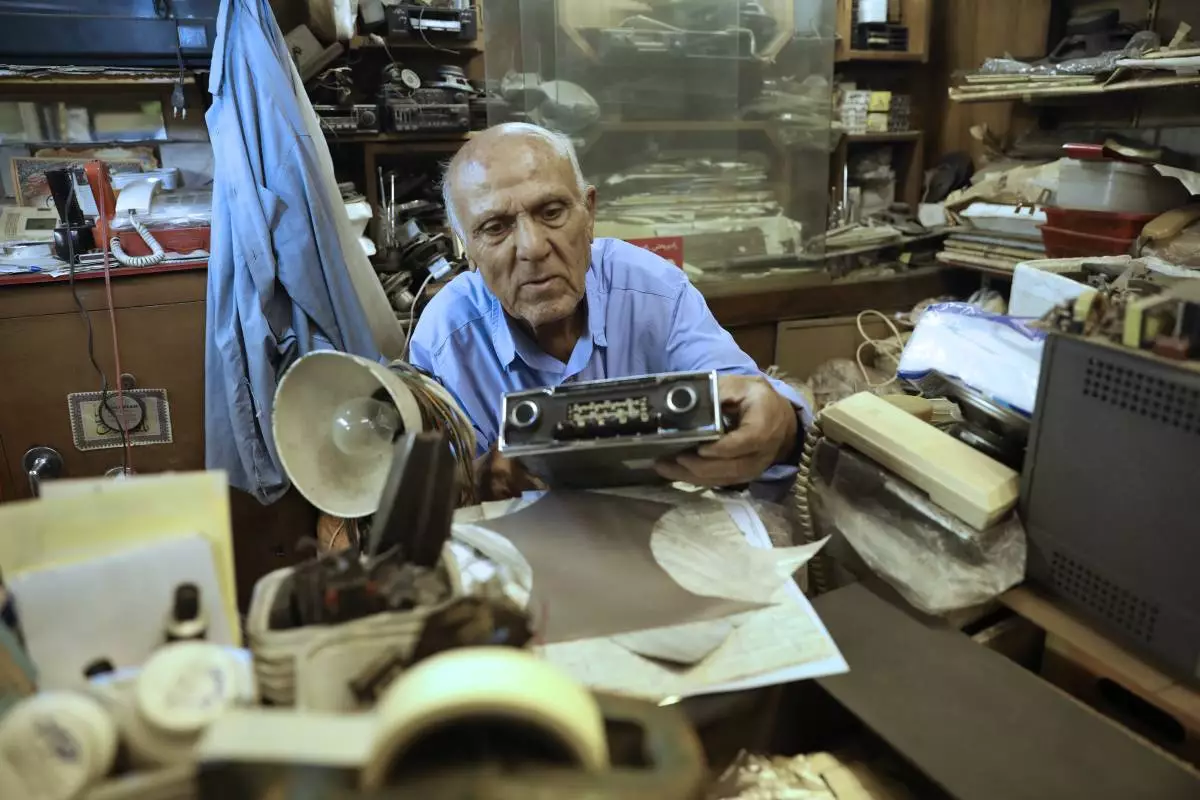
Reza Alimirzaei, 73, who repairs and sells old radios, works at his shop in downtown Tehran, Iran, Wednesday, Sept. 18, 2024. (AP Photo/Vahid Salemi)
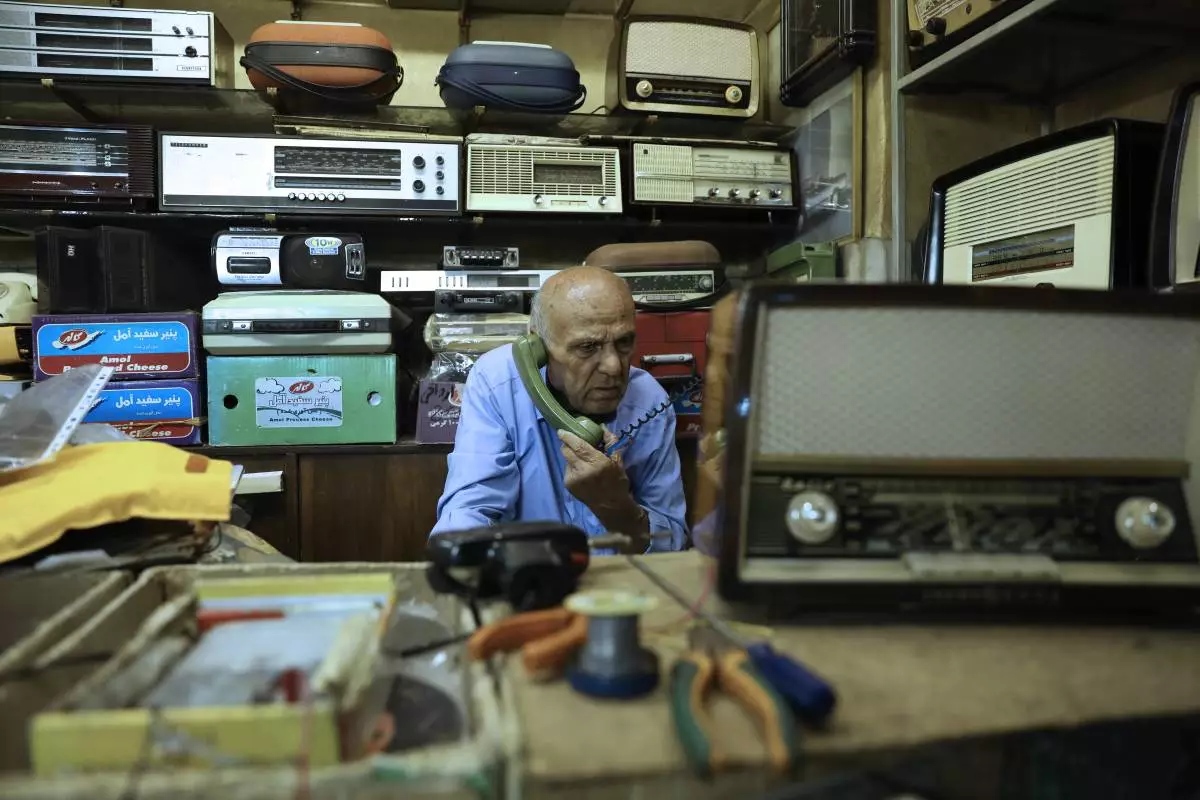
Reza Alimirzaei, 73, who repairs and sells old radios, talks on the phone at his shop in downtown Tehran, Iran, Wednesday, Sept. 18, 2024. (AP Photo/Vahid Salemi)
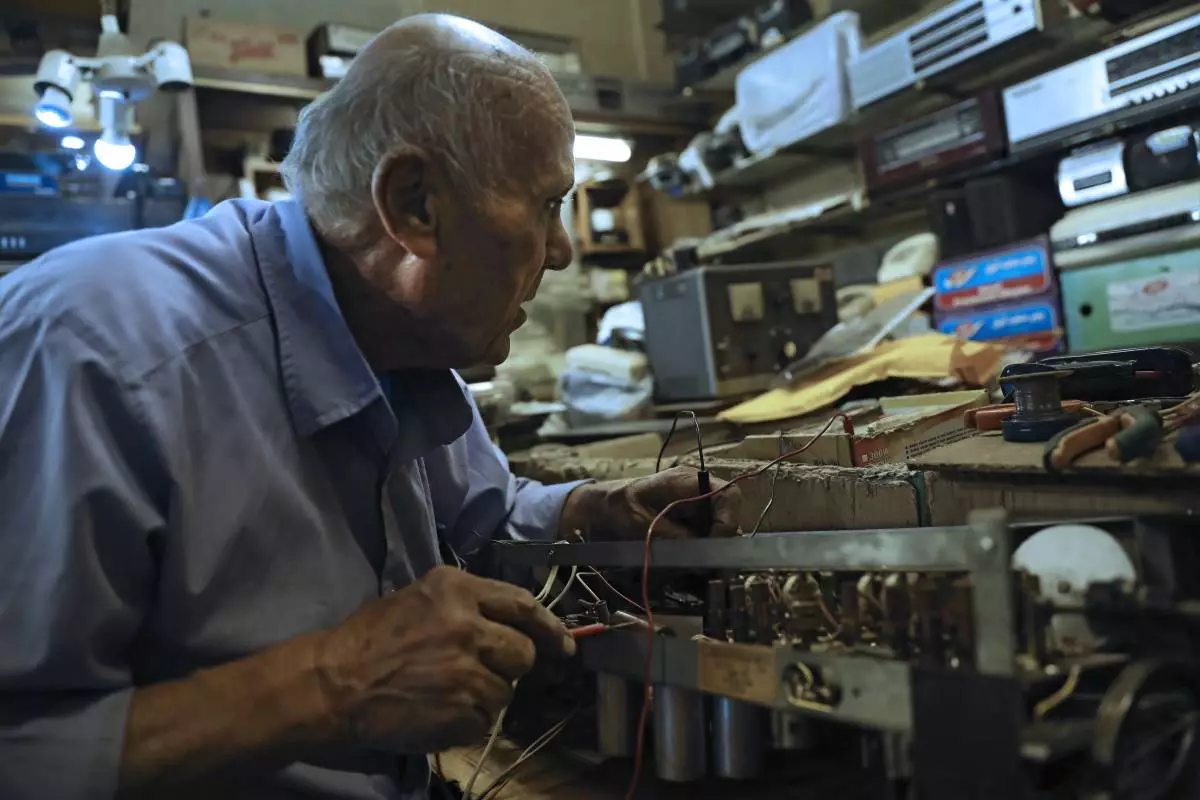
Reza Alimirzaei, 73, who repairs and sells old radios, works at his shop in downtown Tehran, Iran, Wednesday, Sept. 18, 2024. (AP Photo/Vahid Salemi)
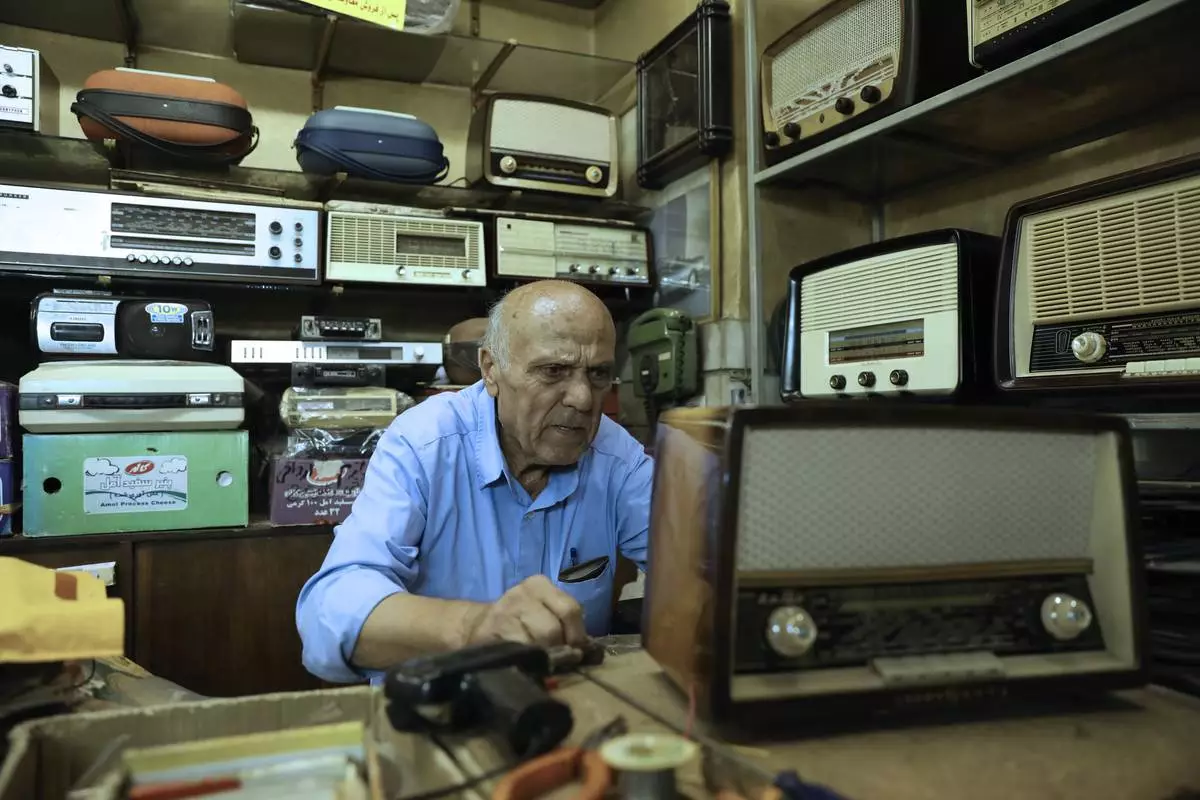
Reza Alimirzaei, 73, who repairs and sells old radios, works at his shop in downtown Tehran, Iran, Wednesday, Sept. 18, 2024. (AP Photo/Vahid Salemi)
NEW YORK (AP) — One presidential candidate is talking up gun ownership and promising tough border security measures. The other vows to cap credit card interest rates and force insurance companies to cover in vitro fertilization.
Which one is the Democrat and the Republican?
The lines that have long defined each party's policy priorities are blurring as Kamala Harris and Donald Trump seek to expand their coalition in the final weeks of a fiercely competitive election. The contest may well hinge on how many disaffected suburban Republicans vote for Harris and how much of the Democrats’ traditional base — African Americans, Latinos, young people and labor union members — migrates to Trump.
That's prompting both candidates to take stances that would have once been anathema to their bases, scrambling longtime assumptions about what each party stands for.
“There’s a whole host of issues that draw people to support President Trump, and quite frankly, these are issues that used to be core pillar issues of the Democratic Party,” Tulsi Gabbard, a former Democratic congresswoman from Hawaii who has emerged as a top Trump ally, said in an interview.
Barbara Comstock, who co-chaired Nikki Haley's GOP presidential campaign earlier this year, is now backing Harris. A former Republican congresswoman from Virginia, she marveled at feeling more aligned with Democrats this year, pointing to Harris’ call for an expanded child care tax credit, support for a tough bipartisan immigration bill and a foreign policy stance that Comstock said was in stark contrast to Trump’s admiration for leaders like Russian President Vladimir Putin.
“As a Republican, I feel like, hey, the Democrats are on my side now,” Comstock said in an interview.
Of course, Trump has broken from the GOP’s traditional conservative values on issues like trade and foreign policy for much of the past decade. But he has gone further this fall, testing the loyalty of social and small-government conservatives with an agenda that downplays his opposition to abortion and calls for significant government intervention in health care and the economy.
Trump last week said he wanted the federal government to cap credit card interest rates at 10%, a move that quickly irked fiscal conservatives. He said last month he supports a federal law that would force insurance companies to pay for IVF, frustrating some social conservatives who believe the embryos used in the process should be protected. Republicans in Congress have repeatedly voted against the issue.
Gabbard declined to say whether she views Trump as a conservative, instead describing his policy approach as “common sense."
In addition to IVF, she pointed to the Trump-backed criminal justice reform that reduced sentences for many inmates. She also highlighted a foreign policy philosophy that seeks to avoid U.S. involvement in global conflicts like the Russian invasion of Ukraine.
“A lot of political independents and a lot of Democrats don’t recognize the Democrat Party of today where not a single Democrat in the House or Senate is standing up and saying we need to bring an end to the war in Ukraine,” Gabbard said.
Gabbard and Robert F. Kennedy Jr., both former Democrats, have emerged as the Trump campaign's most visible national surrogates in his bid to win over undecided Democrats and independents. The campaign has been slow to embrace other would-be allies, including Haley, who issued her first fundraising appeal on Trump's behalf just last week.
By comparison, Harris has adopted a more organized program to connect with Republican voters.
In recent days, her campaign has hosted events around abortion rights, border security and small business creation that featured Republican officials. Seven Republicans were granted speaking slots at the Democratic National Convention last month. And a slew of outside groups are spending millions of dollars to help Harris connect with disaffected Republicans, including Republican Voters Against Trump and the Anti-Psychopath PAC.
At the same time, Harris has embraced a much more muscular foreign policy. She has vowed to feature a Republican in her Cabinet if elected. And she is speaking more openly about owning a gun — and her willingness to use it.
“I'm a gun owner,” Harris told Oprah Winfrey late last week.
“I did not know that!” the television star, a Harris supporter, said in surprise.
“If somebody breaks in my house they're getting shot. Sorry,” Harris responded with a laugh.
Harris' support for robust U.S. leadership on the global stage has already helped her win the support of more than 100 Republican national security and foreign policy officials who previously served under Presidents Ronald Reagan, George H.W. Bush, George W. Bush, and Trump himself. Former Vice President Dick Cheney is among the notable converts.
While Harris and Trump are embracing policies that appeal to the other side, their priorities still largely align with their party's tradition.
Trump opposes abortion rights and says he is proud that the Supreme Court he transformed with conservative appointees overturned Roe v. Wade. He says abortion laws should be left to states, but he plans to vote this fall to uphold a Florida law that bans all abortions after six weeks of pregnancy, before many women realize they're pregnant.
The Republican former president has promised the largest deportation in U.S. history and pledges to finish a massive border wall to stop illegal immigration. He calls climate change “a hoax” and has outlined an energy plan that offers strong support for the fossil fuel industry. He wants to expand tax cuts that disproportionately benefit the richest Americans. He opposes virtually all restrictions on gun ownership. And he strongly opposes diversity and inclusion initiatives designed to promote civil rights.
Still, his team believes his policy platform offers much for persuadable Democrats to like.
Trump spokesman Brian Hughes argued that the GOP nominee has appeal among African Americans, Hispanics and labor union members. Notably, the Teamsters Union, which has long supported Democrats, announced last week it would not endorse either presidential candidate, which was viewed as a big win for Trump.
“We are already demonstrably inside their base no matter how hard they insist we’re not,” Hughes said.
Harris, meanwhile, has only just begun to articulate specific policy plans, having been in the presidential race for just eight weeks. But her record and her recent statements make clear that she favors liberal policies in most cases.
Harris supports abortion rights as they were protected under Roe. She backs a ban on assault weapons and wants to extend to all Americans the $35 cap on insulin and $2,000 annual cap on out-of-pocket prescription drug spending enacted for seniors under President Joe Biden. She called for a ban on price gouging for groceries while pushing for a pathway to citizenship for immigrants in the country illegally.
She has pledged bold action to combat climate change, although she says she supports fracking — a shift from her position in 2020. She supports labor unions. And she supports voting rights legislation designed to combat racial discrimination.
“Vice President Harris’ focus on opportunity and freedom speaks to fundamental American values that transcend party lines," said Harris spokesperson Mia Ehrenberg. "Any American looking to turn the page on Trump’s chaos and division and chart a new way forward for America has a home in Vice President Harris’ campaign.”
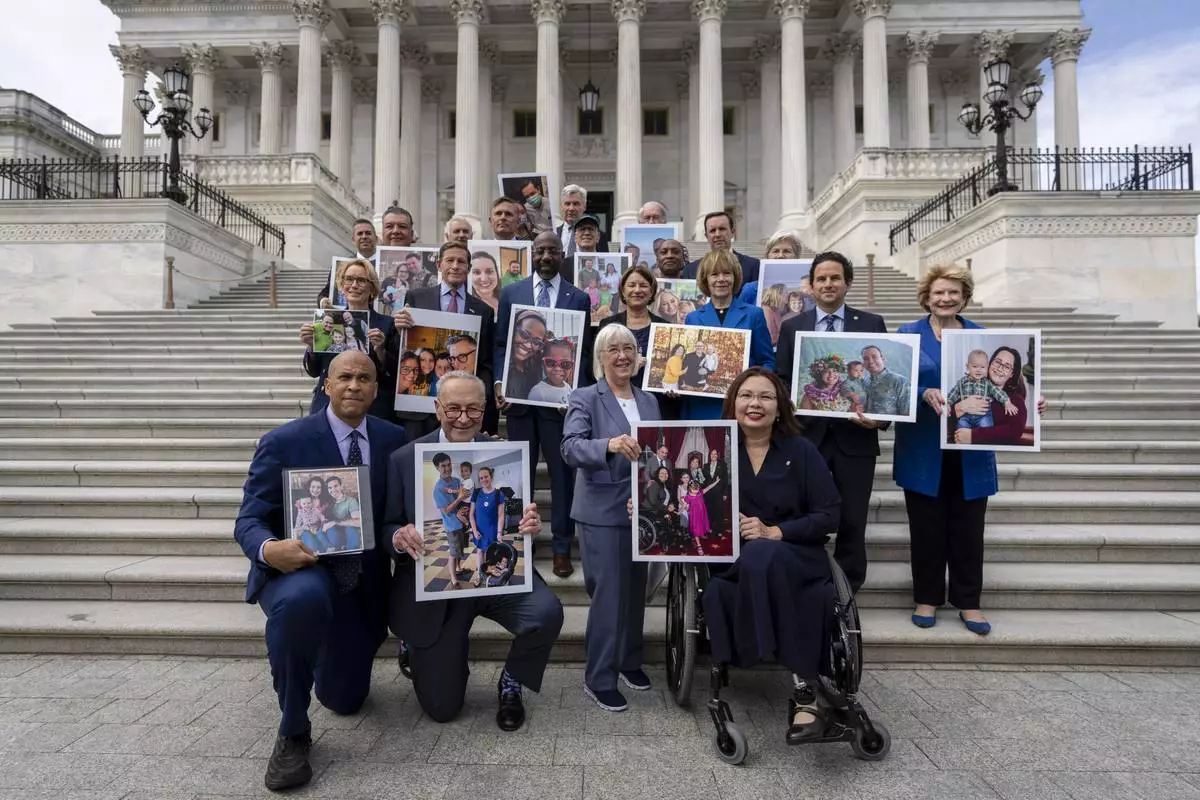
Front row, left to right, Sen. Cory Booker, D-NJ., Senate Majority Leader Chuck Schumer, D-NY, Sen. Patty Murray, D-Wash., and Sen. Tammy Duckworth, D-Ill., pose for a photograph after speaking about the need to protect rights to in vitro fertilization (IVF), on the Senate steps at the Capitol in Washington, Tuesday, Sept. 17, 2024. (AP Photo/Ben Curtis)
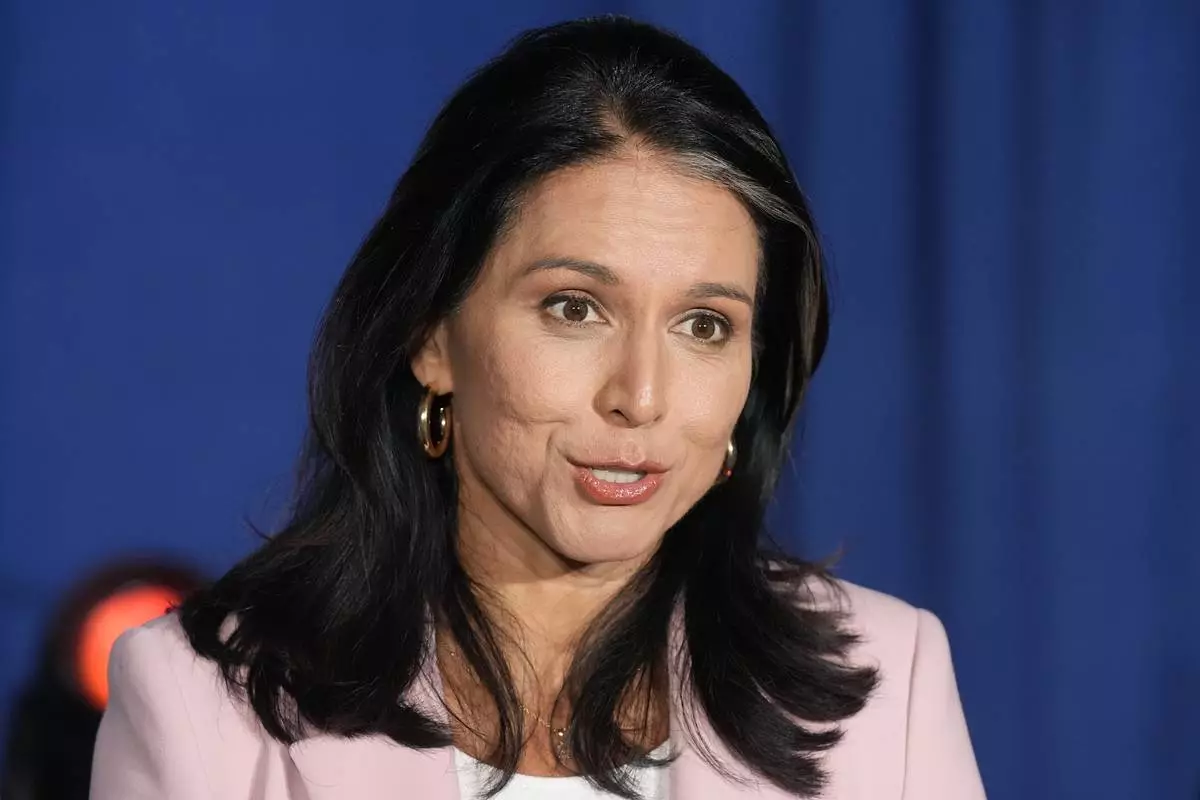
Former Democratic Rep. Tulsi Gabbard answers a question as she speaks to the media after a campaign event for Republican presidential nominee former President Donald Trump, Saturday, Sept. 14, 2024, in Glendale, Ariz. (AP Photo/Ross D. Franklin)
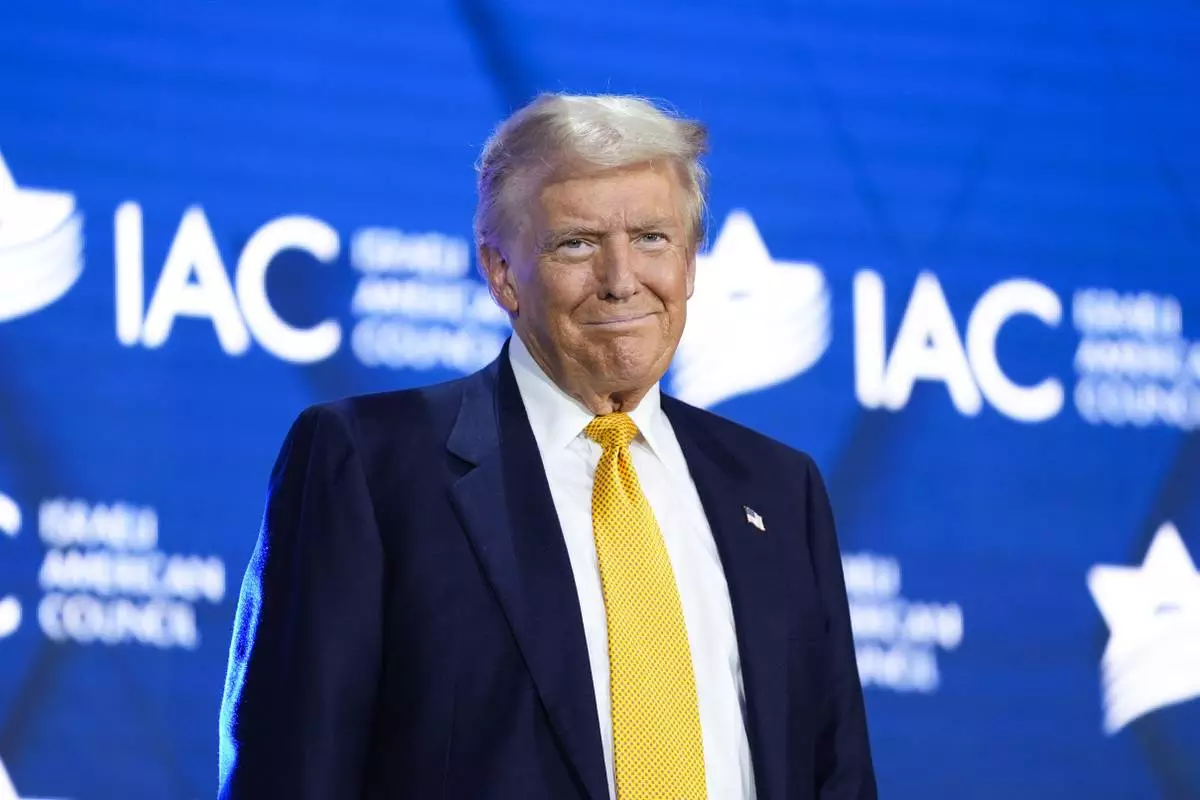
Republican presidential candidate former President Donald Trump arrives to speak at the Israeli American Council National Summit, Thursday, Sept. 19, 2024, in Washington. (AP Photo/Evan Vucci)
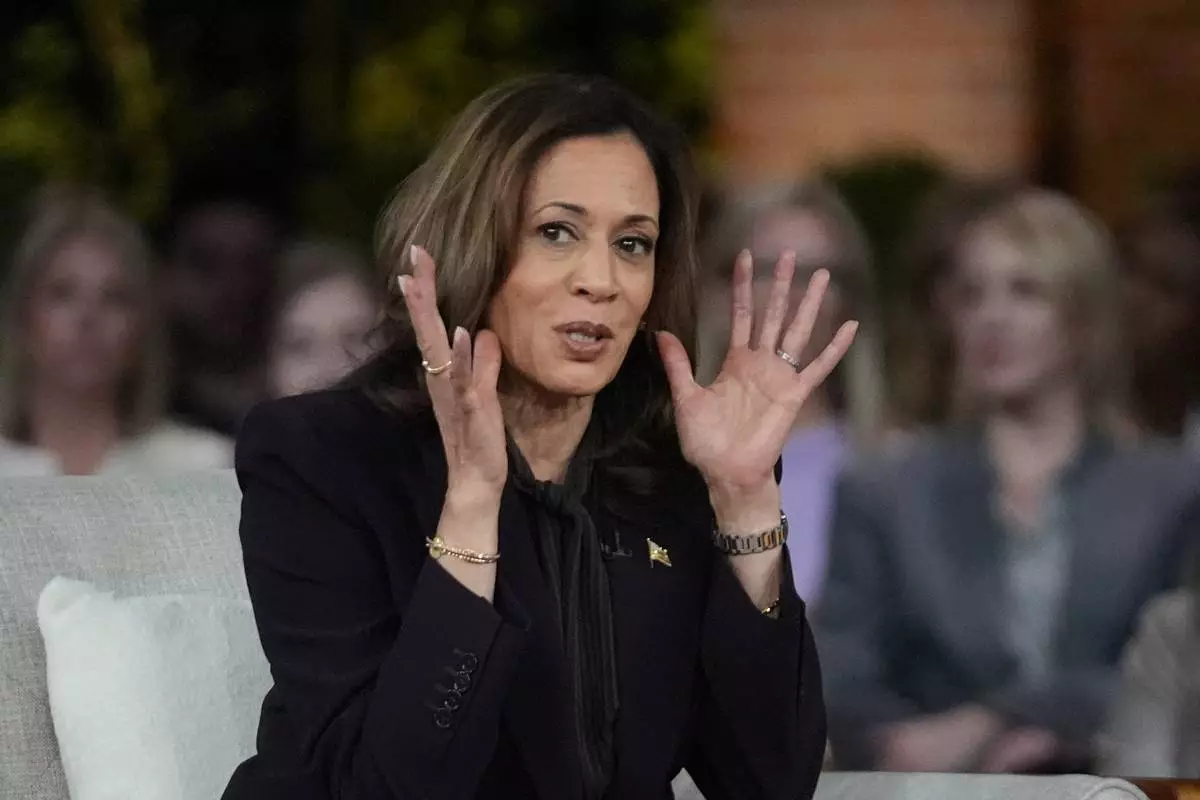
Democratic presidential nominee Vice President Kamala Harris speaks as she joins Oprah Winfrey at Oprah's Unite for America Live Streaming event Thursday, Sept. 19, 2024 in Farmington Hills, Mich. (AP Photo/Paul Sancya)
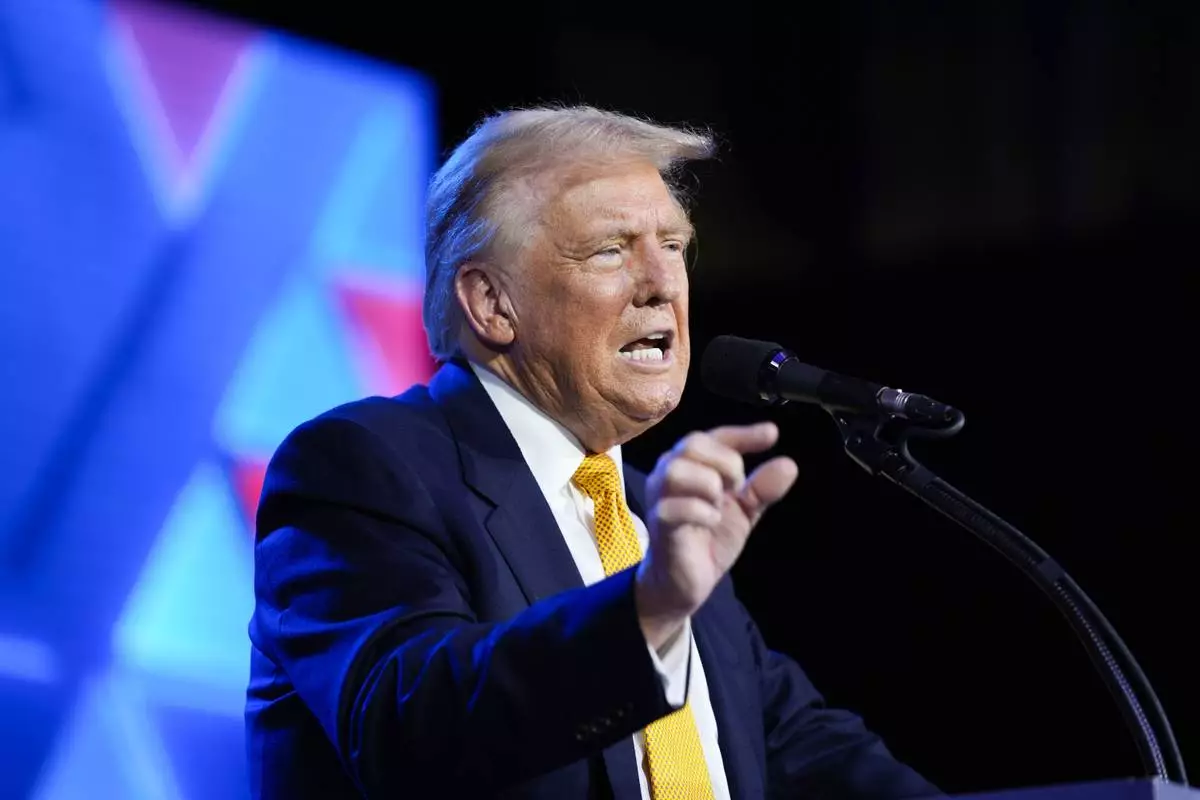
Republican presidential nominee former President Donald Trump speaks at the Israeli American Council National Summit, Thursday, Sept. 19, 2024, in Washington. (AP Photo/Evan Vucci)
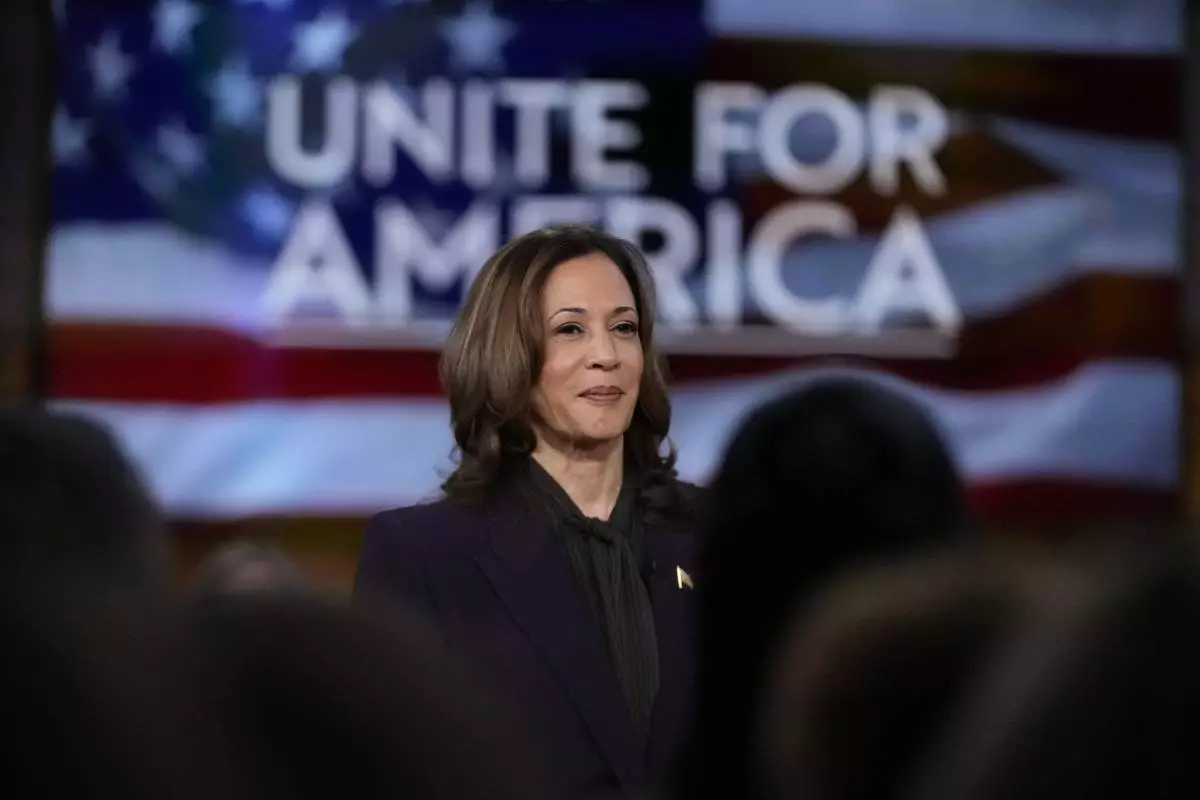
Democratic presidential nominee Vice President Kamala Harris listens as she joins Oprah Winfrey at Oprah's Unite for America Live Streaming event Thursday, Sept. 19, 2024 in Farmington Hills, Mich. (AP Photo/Paul Sancya)






